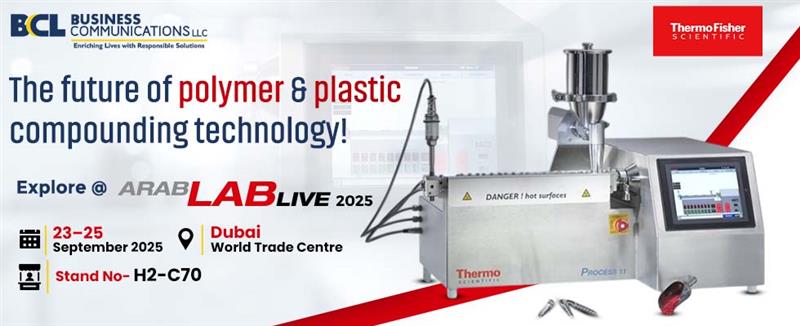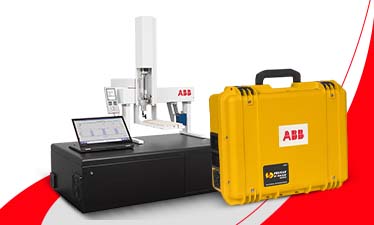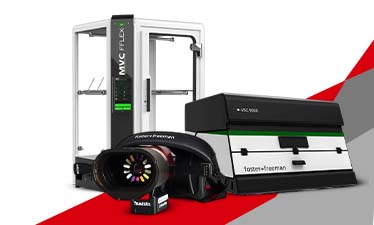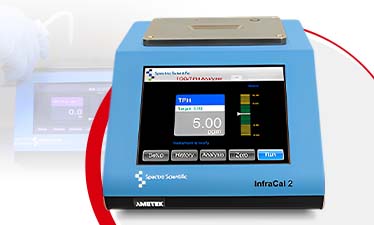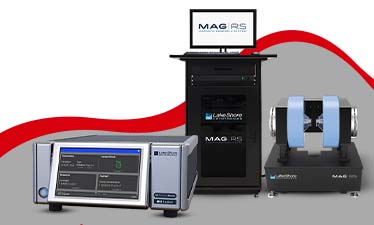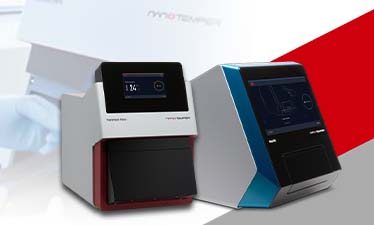Why Booth H2-C70 Might Be the Most Exciting Stop at ArabLab 2025
ArabLab 2025 will once again serve as a global meeting point for scientific and industrial advancement, attracting decision-makers from research, manufacturing, and product development sectors.
This year, visitors seeking high-performance laboratory solutions for small-scale formulation and process optimisation will find a key highlight at Stall No: H2-C70. The Thermo Scientific™ Process 11 Parallel Twin-Screw Extruder will be presented in live demonstrations, offering a compact and versatile extrusion platform that aligns with the strong growth trajectory of the laboratory equipment market worldwide and in the Middle East.
Global and Regional Market Context
The global laboratory equipment market in 2025 is valued at approximately USD 31.82 billion, with a CAGR forecast of 7.7% through 2033.
Within this landscape, the Middle East represents a growing and strategically significant segment. In 2025, the Middle East laboratory equipment market is valued at approximately USD 1.38 billion, accounting for around 4.35% of the global market. This marks an impressive growth of roughly 73.5% since 2021, with a projected CAGR of 7.95% through 2033.
The UAE, host to ArabLab, holds a notable 17.5% share of the region’s market, supported by advanced healthcare infrastructure, strong pharmaceutical R&D presence, and government-backed innovation programmes. Saudi Arabia leads the region with 26.4% market share, driven by healthcare R&D investment, ageing population demands, and adoption of automation technologies.
Meeting the Evolving Demands of R&D
The analytical laboratory instrument market, valued at USD 124.52 billion in 2025, is growing at 7.8% annually, propelled by healthcare expenditure, rising chronic disease prevalence, and rapid technology adoption.
In this environment, laboratories must shorten development cycles while reducing resource usage and environmental impact. Large-scale extrusion systems often create bottlenecks at early R&D stages due to high material needs and extended changeover times.
The Process 11 resolves these challenges with its ability to process as little as 20 grams per run, making it suitable for high-value materials and tight laboratory spaces.
Compact Design Built for Accuracy
Designed as a bench-top twin screw extruder for R&D, the Process 11 combines controlled material processing with easy parameter adjustments for temperature, screw speed, and feed rate. Its co-rotating parallel screw design ensures consistent mixing and reproducibility, which is essential for moving from concept validation to pilot production without costly rework.
From Polymers to Proteins: Broad R&D Potential
The GCC market rise is closely tied to sectors such as pharmaceuticals, advanced food technology, and packaging materials, all of which demand adaptable laboratory tools.
The Process 11 serves a wide range of applications in this context:
- Small plastic extrusion machine for polymer compounding and material property testing
- Extrusion machine for plant-based meat lab research in hygienic configurations
- Extruder for developing food or cosmetic formulations with precise texture and ingredient dispersion
- Lab equipment to make film or fiber samples from melt for packaging, textile, and composite material innovation
From Formulation to Test-Ready Samples
The laboratory equipment and disposables market is valued at USD 37.84 billion in 2025 and forecast to reach USD 55.73 billion by 2030. With disposables already accounting for over 52% of market share, equipment that minimises material waste and reduces reliance on consumables is increasingly attractive.
The Process 11 supports this goal by delivering full formulation-to-sample workflows with minimal input volumes. Accessories such as pelletizers, sheet take-off systems, filament spoolers, and melt pumps produce ready-to-test specimens. These can be analysed for mechanical and optical performance using the Thermo Scientific™ HAAKE™ MiniJet Pro Injection Molding system.
Sustainability and Cost-Efficiency in Focus
Globally, the refurbished laboratory equipment market is valued at USD 26.1 billion in 2025 and is expected to grow to USD 38.6 billion by 2034, reflecting demand for cost-effective and sustainable procurement.
In the GCC regions, where healthcare investment and R&D budgets are expanding, the Process 11’s low material consumption and ability to adapt to multiple applications in a single platform help laboratories achieve operational efficiency and reduce capital expenditure.
Live Demonstration at ArabLab 2025
Visitors to ArabLab Live Exhibition 2025 will have the opportunity to see the Process 11 in operation.
At Stall No: H2 C70, our specialists and the Thermo Scientific team will demonstrate how:
- Rapid parameter optimisation,
- Minimal material use, and
- Multi-application capability
Can help laboratories meet market demands for speed, flexibility, and sustainability.
Live interaction with the system will provide attendees with an immediate understanding of how it can integrate into existing workflows and support both commercial and research objectives.
Finally..
For R&D teams in polymers, food technology, cosmetics, and packaging, the Process 11 Parallel Twin Screw Extruder offers a precision driven, resource efficient platform designed to fast track innovation. Its versatility and minimal material requirements make it a smart investment for laboratories aiming to cut development time, reduce costs, and deliver consistent results.
Visitors to ArabLab 2025 should make it to Stall No: H2 C70 and see first hand how this advanced technology can transform the journey from concept to market ready product.



